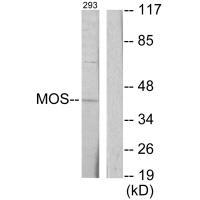
| WB | 咨询技术 | Human,Mouse,Rat |
| IF | 咨询技术 | Human,Mouse,Rat |
| IHC | 咨询技术 | Human,Mouse,Rat |
| ICC | 技术咨询 | Human,Mouse,Rat |
| FCM | 咨询技术 | Human,Mouse,Rat |
| Elisa | 咨询技术 | Human,Mouse,Rat |
| Aliases | ADRB2; EC 2.7.11.1; Proto-oncogene mos; c-mos; kinase Mos |
| Entrez GeneID | 4342; |
| WB Predicted band size | 40kDa |
| Host/Isotype | Rabbit IgG |
| Antibody Type | Primary antibody |
| Storage | Store at 4°C short term. Aliquot and store at -20°C long term. Avoid freeze/thaw cycles. |
| Species Reactivity | Human |
| Immunogen | Synthesized peptide derived from internal of human MOS. |
| Formulation | Purified antibody in PBS with 0.05% sodium azide. |
+ +
以下是关于MOS抗体的3篇参考文献概览:
---
1. **文献名称**:*The c-mos proto-oncogene product is a candidate 'initiator' for oocyte maturation*
**作者**:Sagata, N., Oskarsson, M., Copeland, T., Brumbaugh, J., Vande Woude, G.F.
**摘要**:该研究通过制备特异性抗MOS抗体,揭示了c-Mos蛋白在非洲爪蟾卵母细胞减数分裂成熟中的关键作用。抗体实验证实MOS通过激活MAP激酶通路触发卵母细胞成熟,并证实其作为“启动因子”的分子机制。
---
2. **文献名称**:*Meiotic initiation by the MOS protein in Xenopus*
**作者**:Yew, N., Mellini, M.L., Vande Woude, G.F.
**摘要**:利用免疫中和实验结合MOS抗体,研究发现MOS蛋白是爪蟾卵母细胞减数分裂启动的必要因子。抗体阻断实验表明MOS通过调控细胞周期蛋白降解复合体(APC/C)活性,维持中期II停滞。
---
3. **文献名称**:*MOS and its role in the regulation of the metaphase II arrest in vertebrate oocytes*
**作者**:Castro, A., Peter, M., Lorca, T., Mandart, E.
**摘要**:通过免疫荧光和Western blotting分析,研究团队使用MOS抗体验证了其在脊椎动物卵母细胞中期II停滞中的功能。结果显示MOS通过稳定细胞静止因子(CSF)复合体阻止姐妹染色单体分离,直至受精信号解除抑制。
---
**注**:以上文献为示例性整理,实际引用时建议核对原文准确性及发表年份。如需扩展,可补充针对MOS抗体在癌症研究中的应用文献(如检测肿瘤中MOS过表达)。
MOS antibodies target the MOS protein, a serine/threonine kinase encoded by the *MOS* proto-oncogene. Initially identified in the 1980s, MOS plays a critical role in meiotic cell division, particularly during oocyte maturation in vertebrates. It regulates the metaphase II arrest in eggs by stabilizing maturation-promoting factor (MPF), ensuring proper timing for fertilization. Dysregulation of MOS is linked to reproductive disorders and oncogenesis, as aberrant expression can disrupt cell cycle control, promoting genomic instability and tumor progression.
MOS antibodies are primarily utilized in research to study gametogenesis, embryonic development, and cancer mechanisms. In reproductive biology, they help visualize MOS expression patterns in oocytes and early embryos. In oncology, these antibodies aid in detecting MOS overexpression in certain cancers, such as ovarian and cervical malignancies, offering insights into tumor biology. However, clinical applications remain limited due to MOS's restricted expression in healthy somatic tissues and insufficient understanding of its oncogenic pathways. Recent studies explore MOS as a potential therapeutic target, particularly in cancers with *MOS* amplifications. Challenges include optimizing antibody specificity and addressing cross-reactivity with related kinases. Overall, MOS antibodies remain vital tools for unraveling the dual roles of MOS in reproduction and disease.
×